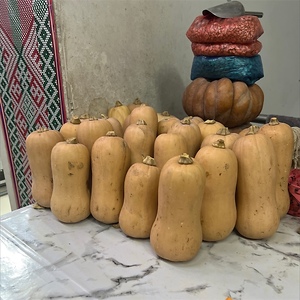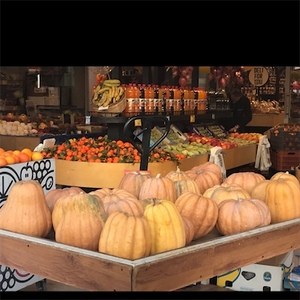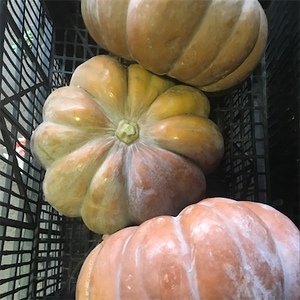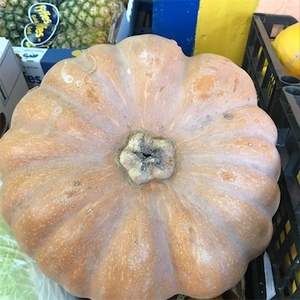

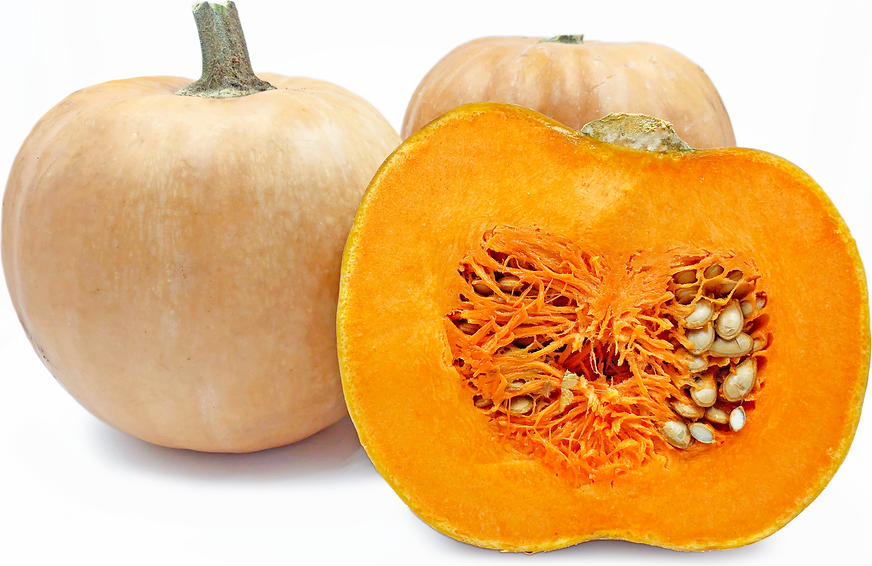
Muscat Squash
Estimated Inventory, lb : 0
Description/Taste
Muscat squash is one of the larger varieties, though the timing of harvest can result in a wide variation in size and shape. The hard rind matures from dark green to an orangey beige and cinnamon brown when ripe. As they mature the rind develops deep ribs, especially in larger fruits. Muscat squash average between 10 and 20 pounds each. Their deep orange flesh is somewhat fibrous with a medium seed cavity. Muscat squash offers a sweet, earthy flavor.
Seasons/Availability
Muscat squash are available year-round with a peak season in the fall.
Current Facts
Muscat squash, or Muscat pumpkin, is an heirloom variety from Europe. It is a likely ancestor to the hybrid Musquee de Provence in the south of France. Muscat squash is highly variable in appearance and size, ranging from smaller, rounded fruits of 11 pounds (4 kilograms) to very large, flattened, deeply ribbed fruits weighing as much as 44 pounds (20 kilograms). The winter squash variety is used in both sweet and savory applications and is most commonly found in Europe.
Nutritional Value
Muscat squash is rich in vitamin A and beta-carotene and fiber. They are a good source of vitamin C, potassium, and manganese, and contain omega-3 fatty acids, B-complex vitamins, and traces of copper.
Applications
Muscat squash are roasted, baked, stuffed, mashed and pureed. Smaller sized pumpkins are deseeded and baked then filled with rice, quinoa, or couscous. Larger fruits are sold whole or in wedged, personal-size portions. Prepare with the skin on or remove it with a vegetable peeler. The flesh is cooked with onions and herbs till soft and pureed for ravioli or tortellini filling. Roast slices or diced pieces for side dishes, to add to pastas or rice dishes. Add cooked, chilled pieces of pumpkin to salads. Grated or shredded Muscat squash is also used in sweet applications like pancakes, muffins, and chocolate cakes or cut into bite-sized pieces, pickled and sweetened for pumpkin jam. Muscat squash stores very well in dark, cool areas and will keep for up to 9 months. Any cut portions can be refrigerated for up to a week.
Ethnic/Cultural Info
Muscat squash is often referred to as Muscat de Provence or Muscat pumpkin, particularly in the eastern Mediterranean region. The origin of the word pumpkin comes from the Greek word for ‘large melon’ which is “pepon”. Muscat pumpkins are popular in the Balkan peninsula countries of Bulgaria and Greece.
Geography/History
Muscat squash may be native to parts of southern Europe and the Mediterannean region, but it has its origins in Latin America. Christopher Colombus brought pumpkin seeds back to Spain and from there they were carried north to France and eastward to Turkey. They are popular in the Eastern Mediterranean region and can be found in Italy, Greece, and Bulgaria. In Bulgaria, Muscat squash is identified as a ‘landrace’ variety. The term refers to local varieties that have adapted over a period of hundreds of years to the natural and cultural environment of the region. Outside of this region there is less variation of the heirloom squash and it tends to take on the larger, more ribbed appearance. Muscat squash grows well in most climates; however, in areas with shorter summers the fruit may not grow as large. Muscat squash are commercially grown in Honduras, Argentina, Uruguay, Portugal, Spain, and France for European markets. They may be spotted at farmer’s markets in the United States, Europe, Africa and South America.
Recipe Ideas
Recipes that include Muscat Squash. One



